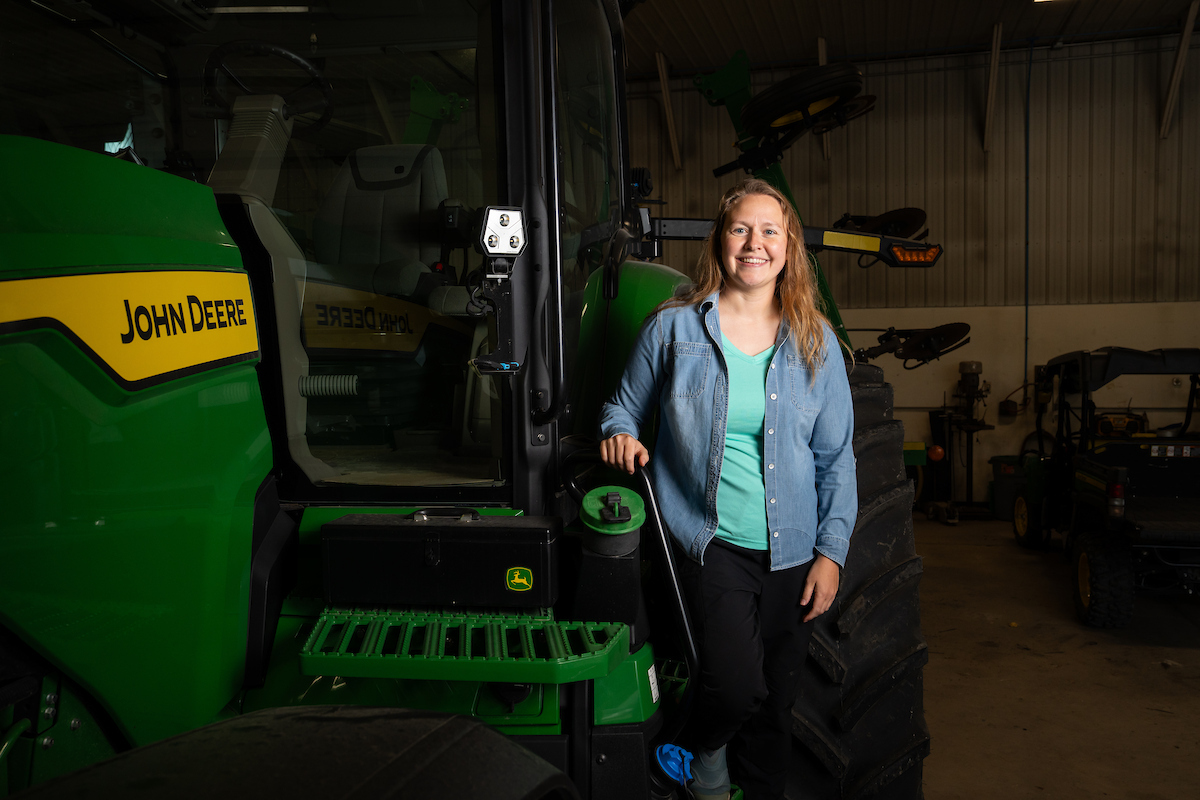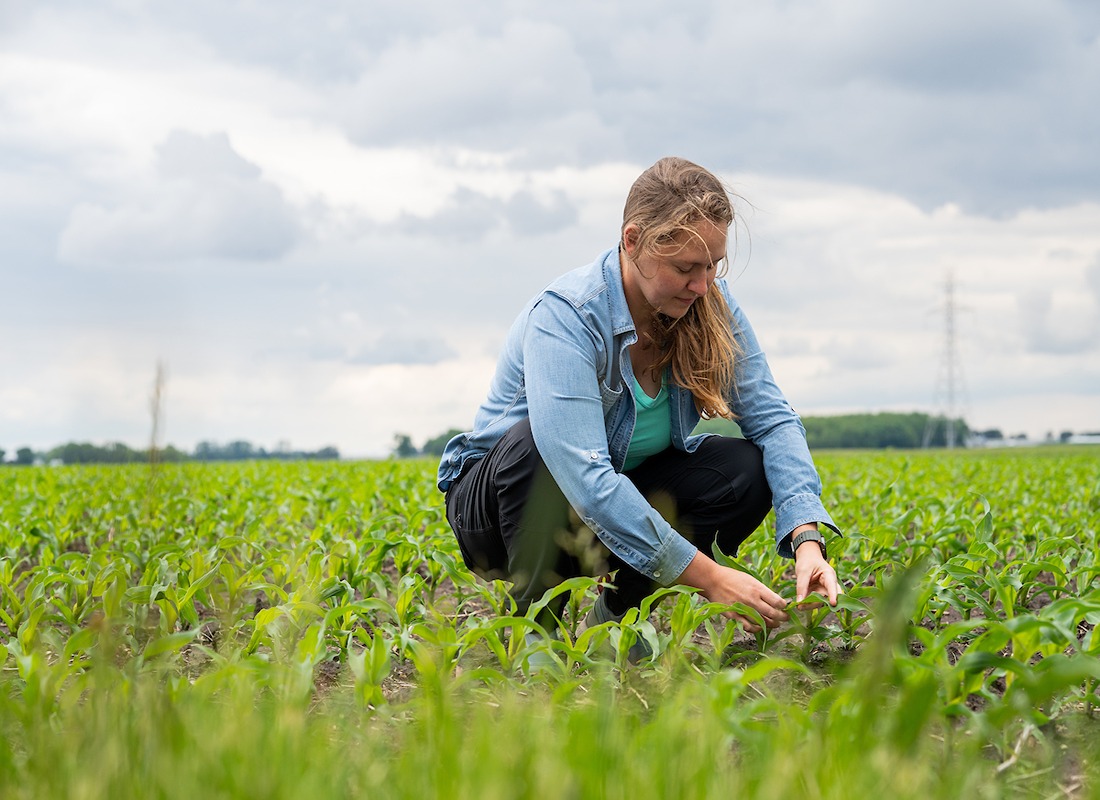Behind the Research: Rachel Stevens
About the Feature
Many people are involved in the remarkable range of programs, services and facilities that undergird research in the College of Agriculture. Collectively they’re integral to the college fulfilling its research mission. “Behind the Research” explores their individual roles. Each academic year, we profile six people whose work supports the College of Agriculture’s global reputation for developing innovative, multidisciplinary solutions to challenges and then putting those solutions into action.
Rachel Stevens, Agronomy Center for Research and Education Farm Manager
- Acquiring a new grain bin system for the farm, which will fit the entire grain harvest
- Managing the logistical puzzle of dividing farm space and resources among some 80 researchers
- Helping researchers tackle major questions around climate resilience and crop management
Rachel Stevens is thrilled about the new grain bins. The old bins at Purdue’s Agronomy Center for Research and Education (ACRE) could only hold 25 percent of total production, which created a vexing bottleneck during harvest time. The new multi-million-dollar bin system, which Stevens helped acquire, holds 100 percent. As soon as they’re wired up, they’ll be ready to use.
“It’s really exciting, and it’s going to be a huge benefit to the farm,” Stevens says enthusiastically. “I’m really proud we got that done.”
It’s this combination of logistics prowess and farming know-how that make Stevens an excellent fit for what she calls her “dream job.” She manages operations at ACRE, a 1600-acre farm 7 miles northwest of campus. It’s a hands-on lab for students and faculty - 80 researchers from across 15 different departments have projects at ACRE in any given year. Research subjects range from plant breeding and genetics to soil fertility to disease and pest management to digital and precision agriculture.
“For me it’s the best of both worlds,” says Stevens, who has been farm manager since 2021. “I got to be exposed to cool new projects, but I also just got to farm, which I love doing.”
Stevens grew up in agriculture – her parents farmed corn and soybeans in her hometown of Falls City, Nebraska. She always enjoyed helping out in the fields and learning how her father made decisions about crop rotation and crop management. She studied agronomy at the University of Nebraska, and went on to get a master’s degree in mechanized systems management, with an emphasis on precision agriculture.
The combination of plant and soil expertise and applied engineering knowledge have been “a really useful pairing” at ACRE, Stevens says. She’s in charge of day-to-day farm operations as well as long-term planning – scheduling facility upgrades, determining crop rotations, helping researchers manage projects. On any given day she might be making equipment purchases, meeting with grad students, talking with farm technicians about pesticide spraying schedules, and much more.
“It’s an incredibly diverse job,” she says.
One of Stevens’s biggest and most complex tasks is allocating space and resources to the 80 researchers and their 200 or so annual projects.
“They need their fields ready for them, they need to have things in a timely manner – someone once said it’s like having 80 different landlords,” she jokes. “The logistics of all that is a big puzzle we do every winter.”
She works closely with ACRE’s two farm technicians, Aaron Kult and Evan Bossung, who operate the equipment, spray the fields, and help with logistics.
“Anything people credit me with, they get a huge chunk of that credit,” she says. “It’s a team effort.”
She tries to make ACRE a happy, welcoming place for faculty and students. In addition to the 80 faculty projects, there are about 60 grad students who do work at the farm each year, along with numerous undergraduates.
“I really enjoy when researchers have a successful research project and are able to share some of the results of the study,” she says. “Especially if we can then implement it at larger scale on the farm – that’s a really nice full-circle moment.”
Last year, Stevens and her team celebrated ACRE’s 75th anniversary with a field day and research showcase. Two hundred people joined to learn about the farm’s history and growth, and to see awards presented to faculty who’d made significant contributions over the years.
“It was a really great event, and a great way to recognize the amount of research that has come out of this place,” she says. “It’s had such a positive impact on Indiana, the Midwest, and the world.”
When she’s not working, Stevens enjoys spending time with her husband, an assistant professor in agricultural and biological engineering, and their 10-month-old. She loves hiking, quilting, and – perhaps unsurprisingly – gardening.
If her predecessors are any indication, Stevens will be at her dream job for many years to come – in ACRE’s 75-year history, she’s only the third manager. Ozzie Luetkemeier had the job for 37 years, followed by Jim Beaty for another 35.
“I feel very lucky to have this job,” Stevens says. “We’re just really proud of the work we do here and the research community we have.”








